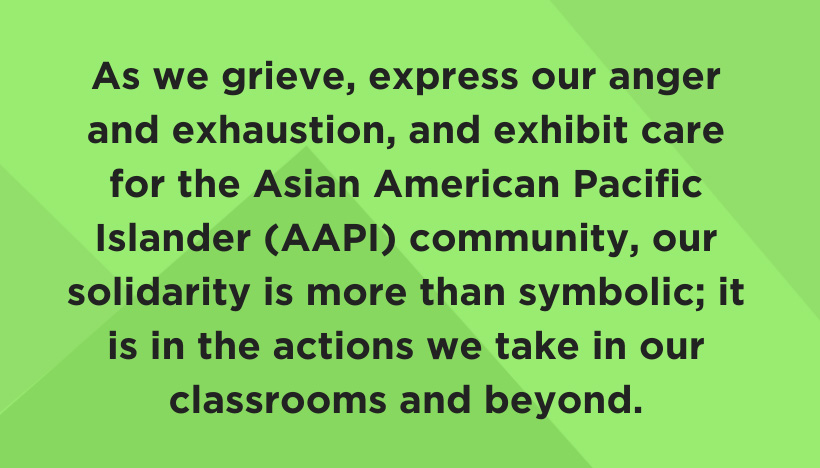From the NCTE Committee Against Racism and Bias in the Teaching of English
This post was written by NCTE members Damián Baca, Kathleen Colantonio, Dulce Flecha, Lorena Germán, Richard Gorham, Felicia Hamilton, Patrick Harris, Dori Harrison, Jazmen Moore, Keisha Rembert, Holly Spinelli, Jineyda Tapia. All are members of the NCTE Committee Against Racism and Bias in the Teaching of English.
Yet again, we find ourselves collectively mourning loss as a result of hate and desired power. As we grieve, express our anger and exhaustion, and exhibit care for the Asian American Pacific Islander (AAPI) community, our solidarity is more than symbolic; it is in the actions we take in our classrooms and beyond.
Since the onset of COVID-19 and its inflammatory and racist framing, the AAPI community has seen increased levels of violence recently, culminating in the deaths of six women of Asian descent. Hate crimes have been heavily reported by Asian women—specifically, verbal harrassment, physical assault, civil rights discrimination, and online harassment.
According to Stop AAPI Hate’s latest national report, AAPI hate crimes topped 3,700 incidents in the time period from the start of the pandemic in 2020 to now, in 2021. NCTE recognized the danger of inappropriately characterizing COVID-19 with divisive, xenophobic language by awarding the 2020 NCTE Doublespeak Award “. . . to any elected official and news media personnel who used, defended, or advocated for the use of phrases such as China Virus, the Chinese Flu, Kung Flu, and Wuhan Flu in place of the COVID-19 virus’s official name.”
These acts of hate have risen in schools as AAPI students reported more instances of bullying in 2020–2021 (Act to Change).
Here are some actions we encourage all ELA educators to take:
- Be deliberate with your language. Think about how your language around the racism experienced by the Asian American Pacific Islander (AAPI) community promotes understanding, cultural awareness, and allyship.
- Be honest and explicit with your students. This is a conversation for our ELA classrooms at all levels. Think about paired texts and discussion prompts to promote critically.
- Be sure you do your homework. No cultures or peoples are monoliths. Recognize the varied histories, experiences, values, languages, places, and cultures that make up the AAPI community.
- Be mindful of internalized trauma. Give your students the space and time to properly process their thoughts and feelings. Ensure that AAPI students are extended care and not expected to carry the burdens of dialogue or education of others.
- Be vocal. Speak up! Our students—those who are members of the AAPI community and others—are always listening. They hear our voices and they also hear our silence. Now is a time to let your students know where you stand.
- Promote action. Translate learning into actionables for students.
Below are some resources to support you in embedding antiracist teaching and learning in support of the AAPI community.
- Activists:
- Consider learning about Betty Yu’s art. She’s an NYC artist and activist. Learn more at her website: bettyyu.net
- Simon Tam (also known as Simon Young) is an activist, musician, and writer. He’s one of the founders of “The Slants,” an all Asian American dance rock band. Learn more at his website: Simontam.org.
- Articles:
- The following are organizations with information and research that you can use for class discussions, projects, and as sources of research for essays.
- Asian Americans for Equality: aafe.org
- Red Canary Song—a grassroots collective for Asian massage parlor workers: Redcanarysong.net
- Asian Americans Advancing Justice: https://www.advancingjustice-alc.org
- Stop AAPI Hate: https://stopaapihate.org
- Literature by AAPI authors
- For children:
- Picturebook: Paper Son: The Inspiring Story of Tyrus Wong, Immigrant & Artist by Julie Leung, illustrated by Chris Sasaki
- Picturebook: Drawn Together by Minh Le, illustrated by Dan Santat
- Picturebook: A Different Pond by Bao Phi, illustrated by Thi Bui
- Picturebook: Hot, Hot Roti for Dada-ji by Farhana Zia, illustrated by Ken Min
- For middle school students:
- Prairie Lotus by Linda Sue Park
- Inside Out and Back Again by Thanhhà Lai (could also be used with high school students)
- For high school students:
- American Born Chinese by Gene Luen Yang
- On Earth We’re Briefly Gorgeous, a novel by Ocean Vuong (see also poetry by Vuong): https://www.oceanvuong.com
- They Called Us Enemy by George Takei (could also be used with middle school students)
- You’ll find additional texts here on the web page of the Asian/Pacific American Librarians Association.
- Here’s a TED talk that could lead to fruitful discussion:
- “Asian Stereotypes—Rethinking Perceptions” by Laura Kim, seventh-grader
- Understanding American history in a more complete way, including the presence of Asians is critical. Consider the following resources:
- A Different Asian American Timeline: https://aatimeline.com/intro
- The Immigrant History Initiative https://www.immigranthistory.org/covid19.html#videos
- For children:
Anti-Asian racism is, of course, nothing new. It has permeated the history of our nation just as other forms of racism have. Our classrooms are the place to examine the truths and complexities of anti-Asian racism so that students understand, empathize, and are positioned to act against such hate.
It is the policy of NCTE in all publications, including the Literacy & NCTE blog, to provide a forum for the open discussion of ideas concerning the content and the teaching of English and the language arts. Publicity accorded to any particular point of view does not imply endorsement by the Executive Committee, the Board of Directors, the staff, or the membership at large, except in announcements of policy, where such endorsement is clearly specified.

